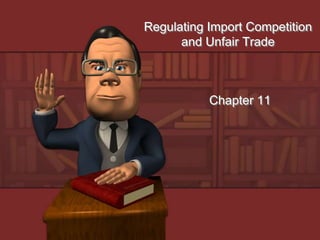International Business Law Ch 11
- 1. Regulating Import Competition and Unfair TradeChapter 11
- 2. Two Main Points Laws regulate imports when local industries need safeguards against injury; breathing room to retool and retrain workers so they can compete more effectively.Laws that regulate unfair foreign competition, particularly dumping prices here at low prices and subsidies by foreign governments.
- 3. Safeguards Against InjuryPrincipally temporary ( 4 year with 4 more possible) tariff increases and quotas.Endorsed by Art. XIX of GATT (1947); the escape clause.Updated in the 1994 WTO Agreement on Safeguards.
- 4. The Escape Clause (1994)When imports are increasing so rapidly that a domestic industry is in imminent peril of serious injury.Serious injury is a ŌĆ£significant overall impairment in the position of a domestic industryŌĆØ (not just a particular company in that industry).
- 5. U.S. Escape Clause ProceduresThe ITC conducts an investigation on its own accord or by a petition by any number of groups.Public hearings take place where all interested parties get to express their views.If other factors are equally to blame, then no escape.U.S. law does not mirror GATT XIX, but it is close.
- 6. Escape Clause: Tariff vs. QuotaTariffs are preferred over quotas.If quotas are used GATT says the bottom limit is the 3 year prior import average.Voluntary import restrictions (such as we did to JapanŌĆÖs autos in the ŌĆś80s) are no longer legal.Tariff concessions to injured nations are expected - to make them whole.
- 7. Special Rules for China Part of the deal for allowing China into the WTO was the U.S.-China Relations Act of 2000, which makes it easier to protect domestic industries from Chinese imports that are ŌĆ£a significant cause of materialinjury.ŌĆØ
- 8. Assistance to Workers & CompaniesTrade adjustment assistance is available to workers put out of work by foreign trade or by having the jobs sent offshore. This is handled by the Dept. of Labor.Assistance is also offered to companies damaged by imports. This is handled by the Commerce Department.
- 10. Antidumping LawsDumping refers to the practice of selling goods in foreign countries for less than they are sold at home.The purpose is generally to drive the domestic companies out of business.Codified in Art. VI of GATT.In the U.S. part of Title 19 U.S.C. & investigated by DOC (& its ITA) and the ITC..
- 11. Dumping MarginThe ITA looks at the difference between the normal value (home price) versus the export price. The difference is the dumping margin, which can be the basis for (equal to) antidumping duties. If the margin is less than 2%, ignore it. For China normal value is a ŌĆ£surrogateŌĆØ value as if it were not government controlled in all price and cost areas.
- 12. Subsidies and Countervailing DutiesSubsidy defined: a government benefitto a firm or industry to achieve somegoal or objective. They take manycreative forms (see p. 374).Subsidies tend to distort the inter-national trade picture.Regulated by GATT and U.S. law.
- 13. Dealing with SubsidiesCountries may respond to subsidies in one of 2 ways. 1) Go to the WTO;2) Unilaterally impose a counter-vailing duty (a special tariff) equal to the amount of the subsidy. Both can be undertaken simultaneously, butonly one relief is available.
- 14. Prohibited SubsidiesA) Export subsidies ŌĆō payments to foster exports.B) Import substitution subsidies ŌĆō payments contingent on using domestic goods.---both of these violate WTO.
- 15. Domestic SubsidiesThere are many ways countries can help their domestic industries.One argument in favor of U.S. universal health care is that other countries do it, which lowers the cost for foreign companies such as car makers.These are generally legal.
- 16. Adverse Effects SubsidiesDomestic subsidies that cause adverse effects are actionable under the WTO or by countervailing duty actions.To be illegal, the subsidy must be specific, not general (i.e. a tax break that favors only one industry, versus one that applies across the board).
- 17. Subsidies & Non-Market EconomiesHow can you countervail domestic subsidies in non-market economies like China? ItŌĆÖs tough.Before 2007 we didnŌĆÖt try, but now we do, principally due to political pressures.
- 18. The Byrd AmendmentThe Continued Dumping and Subsidy Offset Act of 2000 ŌĆō countervailing duties were paid over to the damaged companies, instead of going to the Treasury.This was declared illegal by WTO and repealed in 2007
- 19. For Further StudyThe 2009 Dept. of Commerce Antidumping Manual for the training of Import Administration personnel.http://ia.ita.doc.gov/admanual/index.html


















